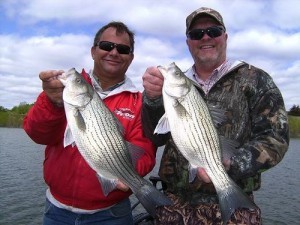
- Fishermen with their striped bass. (Photo credit: HuntFishGuide.com)
From the Anderson Independent Mail:
Those who like to fish at Lake Hartwell should think twice before eating the fish they catch. The state Department of Health and Environmental Control has issued an advisory list of fish not to eat for 2011. Certain fish are contaminated with polychlorinated biphenyls (PCBs), according to David Wilson, chief of the health department’s Bureau of Water.According to the advisory list, no fish caught from Twelve Mile Creek and the Seneca River arm of the lake should be eaten. The state also recommends avoiding striped bass from the remaining waters of Lake Hartwell.
Herb Burnham, president of the Lake Hartwell Association said, “One of our happiest days will be when we can take the ‘don’t eat the fish’ sign down.”
Read the entire article, by Genelle Williams, here.
After all of the warnings about the Catabwa River — which was listed as the most endangered river in the country in 2008, and the reality that there are coal and nuclear plants on its banks, as well as countless other industries that use it as a toilet ... I don't know why North Carolina isn't also advising our state's fishing population to be very, very careful about the fish they catch and eat.
I live near Mountain Island Lake, one of the lakes on the Catawba — Norman and Wylie are two others in the Charlotte area — and witness people fishing along its banks all the time. What I don't see are any warning signs advising fishers of anything. I can only assume that many of them don't read or watch the news, or maybe they're hungry enough to avoid the warnings ... which is possible.
Of course, they can certainly check out the state's fish advisory website, assuming they have Internet access — which, in this economy, is assuming a lot.
Further reading:
The future of food is now — The Washington Post
